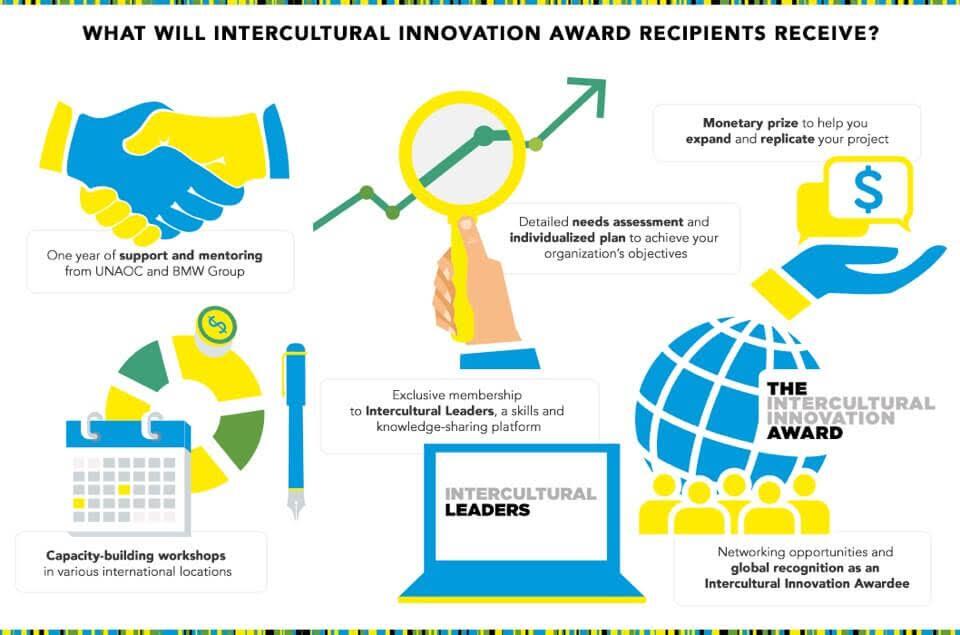The Intercultural Innovation Award is a partnership between the United Nations Alliance of Civilizations (UNAOC) and the BMW Group that aims to select and support the most innovative grassroots projects that encourage intercultural dialogue and cooperation around the world. Eligible to apply for the Intercultural Innovation Award are not-for-profit organizations managing projects focused on promoting intercultural dialogue and understanding, and who are willing to expand their range of action.
Examples include projects in the fields of combating xenophobia, education for global citizenship, interfaith dialogue, migration and integration, prevention of violent extremism, as well as initiatives addressing the needs of
specific groups in promoting intercultural understanding (e.g. faith-based, youth, women, media, etc.) The Intercultural Innovation Award is bestowed upon ten organizations. Awardees receive one year of support and consulting from UNAOC and the BMW Group, which will assist their projects to increase their effectiveness. Support will also be provided to successful projects so that they can be replicated in other contexts or settings where they might be relevant. The specific support received will depend on the individual needs of the projects. A detailed needs assessment will be conducted in conjunction with each of the awardees. UNAOC and the BMW Group will then mobilize resources to help those projects achieve their goals. After one year, a comprehensive evaluation will be performed in order to assess the impact of the Award on successful projects.The organizations of awardees will also become members of Intercultural Leaders, an exclusive skills and knowledge-sharing platform for civil society organizations and young leaders that work on addressing cross-cultural tensions. Through an innovative online system, Intercultural Leaders will harnesses the solidarity of its members to maximize the impact of their work and help them foster cross-cultural understanding and cooperation.
Does your not-for-profit organization qualify?
Organizations that submit a project to the competition need to fulfill each and every one of the following criteria to be deemed eligible:
· Organizations must be registered as a not-for-profit organization, such as a non-governmental organization, charitable organization, research and educational institution, labor union, indigenous group, faith-based organization, professional association, foundation and local or municipal branches of government.
· Applying organizations must have been operational for a minimum of 2 years before April 2017; with funding base and project implementation (i.e. the organization must show registration as non-profit in their country of operation by April 2015 or earlier).
· Applying organizations must be managing a project focused on promoting intercultural dialogue and understanding. Examples include projects in the fields of combating xenophobia, education for global citizenship, interfaith dialogue, migration and integration, prevention of violent extremism, as well as initiatives addressing the needs of specific groups in promoting intercultural understanding (e.g. faith-based, youth, women, media, etc.)
· The applying organization must have the willingness to expand the range of action of the project with UNAOC, the BMW Group and other partners.
· Organizations that have previously received any UNAOC support are not eligible to apply to the Intercultural Innovation Award.
· Projects that have been submitted to previous editions of the Intercultural Innovation Award and were not selected, are eligible and encouraged to apply again. However, applying organizations cannot have been winners of previous editions of the UNAOC Marketplace of Ideas or BMW Group Awards.
Selection Criteria:
How are Intercultural Innovation Awardees selected?
Shortlisted projects will be evaluated against a comprehensive set of criteria. These criteria include three main categories:
THE PROJECT
· Relevance – is appropriate for the targeted audience and in the local context where implemented.
· Quality – undertakes an in-depth analysis of problems/issues and sets a consistent intervention strategy.
· Clarity – sets clear objectives and draws a logical connection between activities, outputs and outcomes.
· Innovation – pushes beyond boundaries and excels in the use of original and novel methods (social media, arts, pedagogical approach, innovative training, etc.)
· Measurability – impact of the intervention is assessable (i.e. number of beneficiaries, polls on attitude change, assessment of behavioral changes, clear policy changes, etc.)
· Sustainability – demonstrates ability to be sustainable in the mid-long term.
· Replicability – has the capacity to be replicated and scaled up in different settings. This is a key evaluation criterion.
THE ORGANIZATION
· Organizational structure – is capable of achieving the goals set in the project.
· Intercultural commitment – has proven interest and commitment in intercultural dialogue, understanding and cooperation (e.g. past reports, reference letters, etc.).
· Work plan and budget – has set a realistic budget to replicate or expand the project.
· Transparency – has made genuine and demonstrated efforts to adopt a policy of transparency.
· Equality – has adopted equality and diversity policies as reflected in staff members, membership and activities.
THE APPLICATION
· Clarity – shows an effective communication of ideas and provides relevant examples.
· Conciseness – provides clear and concise responses to questions.
· Persuasiveness – includes insightful arguments and engaging narrative.


